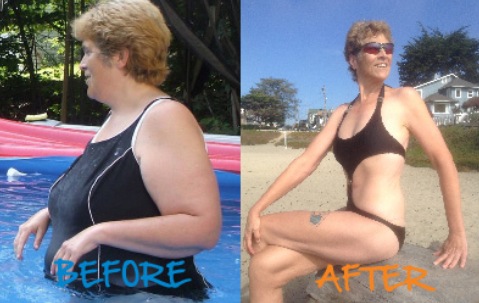BMI, Self-Image and Unexamined Thoughts

Today I'm wondering if it has more to do with the emotional work left undone when the excitement of the huge weight drop is focused on. It's great to focus on the big drop and enjoy it but it is also important to do the emotional and psychological work to embrace a body without a protective layer that keeps the world at a distance. I wonder if not doing this work accounts for people deciding to hang on to the last 30-40 pounds and deciding the BMI chart doesn't apply to them. Again and again, I see the term, "Everyone is different." While that is true, I see it as an excuse to not face fears about a life without fat and finish the job of making the body as healthy as it can be.
I know this pitfall well, which is why I care so much about it and am writing about it now. When I was 333 pounds and got down to 210 in my 30s and 220 in my 40s I said the same thing! "Good enough! I'm big-boned! The BMI-chart doesn't apply to me because I am 6'3" tall. I naturally have a linebacker's body. My body isn't meant to be slim." The thoughts that limited my possibilities seemed to go on and on and they did stop my progress at the exact weights at which I accepted those thoughts as fact.
The last and final time I lost weight I decided to allow my team of professionals, my coach and doctor, to decide when the goal had been reached for my body. I decided it was possible that my thinking about my body was limiting my results.
Imagine my surprise when a slim, sexy, very un-linebacker's body was waiting for me at 175 pounds and a BMI of 21. Imagine! The BMI chart applied to me too!! I try to gently point this out on the message boards I consult on, but people carefully choose their language with the term "I feel." We are taught to respect "I feel" and hold whatever follows in reverence. The problem is that many couch a thought with "I feel" terminology. They are actually expressing what they THINK and the thought, unexamined, limits their potential.
I love to work with people willing to differentiate between what they think and what they feel. These people are willing to examine their thoughts for patterns that limit their possibilities and may even cause a backwards slide into obesity. Really, losing the weight is just the beginning. Working with our thoughts about our weight and almost every aspect of our lives is central to long-term success and health.
I expressed thoughts like this on the message boards and within minutes there were multiple comments from people reverting saying "The BMI chart doesn't apply to me because I feel [this and that]." Losing a lot of weight isn't the end of the journey. It is just the beginning. So I believe examining the thought patterns that led to obesity is key in order to not return to obesity.
The BMI is not a perfect tool. No tool is perfect and there are some concerns as to its' value in all cases and for all bodies. But why not test it ALL THE WAY in your weight loss journey rather than holding-up short of optimal results? What do you think?
I kind of agree with Jane. Also - from the data I've seen, there isn't that much evidence of better heath for those in the "normal" BMI set vs those in the overweight set. My goal is to get to a healthy weight that I can maintain longterm. I'm shooting for a normal BMI, but if that proves to be too hard - if I don't feel well and satisfied and confident about maintaining - at a normal BMI, or in my attempts to get there, then I will (strive to) not feel like a failure landing in the overweight zone. That will still be a huge success for me, since I haven't ever been able to maintain my weight in that zone as an adult. And the data I've seen indicates that I'll still have a greatly reduced risk of diabetes, heart attack, stroke, etc.
To Jane's point, I think it's actually really great for people to alllow themselves to feel successful without achieving a normal BMI. And most doctors don't see success as normal BMI either - my understanding is that most see success as at least 50% loss of excess weight, ideally getting under a 30 BMI, or closer to your lowest adult weight.
With all that said - I'm sure that self-perceptions do play a role and can hamper success. For some it may be scary to become skinny and perceived in a different way. And that may be something to work on, or it may be a valid issue of comfort that influences how far someone wants to take it. I just think everyone should strive for what will work best for them - we all want different things.
After reading your post something occurred to me. Tomorrow is my 4 month post-sleeve anniversary, and I feel completely opposite than people you referred to in your post. As my weight drops, I am more conscious of the BMI vs. weight ratio. I don't want to abandon the BMI stats at all - in fact the BMI chart is crucial to one of my goals - I want to be out of the obese category all together. I have lost 98 lbs in 4 months. It has been a hard, but a totally doable road to go down. I believe that when your mind is ready your body follows. GREAT POST
Edited by matt1912What do I think? I think that I don't wonder why other people choose to decide what they want to weigh. The very idea that I should take another person's emotional inventory is preposterous to me. I'm hoping you don't mean it the way it sounds, but it sound pretty judgmental to be honest.
Edited by une nouvelle vieEdited: Deleted it all. Not worth it.
Edited by une nouvelle vie1. Why does it matter what other peoples goals are? 2. BMI is meant at a statistical measure over large populations and not meant to be an individual mandate. 3. My doctor told me that risk of death and medical issues drops dramatically at 29.9 so that the overweight category is great for someone who used to be morbidly obese. There really is no reason statistically to stress over getting under 25 according to him. 4. Using BMI focuses on the scale which is not an indicator of overall health. Rather use body fat percentage instead. My BMI is 26. Should I lose 35 pounds of muscle to make some BMI of 21 like you? Because my height is not going up and all BMI is is a ratio. 5. Body fat percentage should be a guideline for health not BMI. If those people with 30-40 more to lose have a BF that is in the recommended range for their height why should they lose more pounds of muscle/fat. 6. Some people choose a goal they know they can maintain rather than 1 where they will struggle,gain and feel like a failure. 7. Older people should carry more body fat than younger for insulation, and to protect bones and against any illness. (Body fat guidelines are by age) 8. I repeat number 1 above. What's it to you anyway? I offer my congratulations and am happy for you. But why does it matter to you what others "feel" is right for them.
Edited by playlikeworldchampsThere are normal weight people with heart disease, HBP, and diabetes. I happen to know quite a few of them.
I am not concerned with where i stop. I will know when I know. I would like to be150. I think it's possible. My surgeon would like 175. Also possible.
130 maybe a little harder but I will keep riding this train until it reaches a station and I won't be reviewing a bmi chart
I reread your post and maybe what you were really talking about was how self limiting beliefs can be. That I agree with. I also stand by my initial premise that I see alot more people who beat themselves up over losing massive weight but..never quite good enough...always questioning their own success. Well my initial goal was some pounds heavier than my current weight. I don't really think being a few pounds lighter makes life that much different.
My surgeon also told me that getting underBMI OF 30 is a healthy range for previously morbidly obese person.
I also second the general sentiment of why do you care about others people's goals? I actually find it fascinating that many people on these forums are oddly interested in what others eat (many threads on watching people eat in restaurants), their size and weight etc.
she wrote an article for the magazine about being a consultant for people who have had WLS. she's talking about people looking at why they sell themselves short when they are so close to a "normal" BMI.
this is why she cares about other peoples goals..... its her job.
" Sara Kelly Keenan is a Certified Life Coach, trained by the Academy of Coaching and NLP and a member of ICF, the International Coaching Federation. She works with clients locally in the San Francisco Bay Area and around the world on Skype, FaceTime and landline."
Edited by moonlitestarbriteOk, I guess I don't assume they are selling themselves short. I was really thrilled and pleased to hit goal even though it was over 25 BMI. It is true that I am under 25 now but I still don't buy into the idea that my success at goal was not legit or "not good enough"
Thanks for all your comments. I appreciate them all. The thing I find interesting in the people I have been interacting with is that they embrace the BMI chart, which I acknowledged is an imperfect tool, until they get close to leaving the "obese" range. Then they abandon the tool and take their weight loss no further. I notice this particularly in WLS patients, who experience dramatic and sometimes shocking (to themselves) weight losses. It's as though perhaps it happens too quickly for them so they "step on the brake." It's my job to help people examine their limiting thoughts and behaviors so I am a student of those behaviors. I notice that many people seem to decide to abandon their weight loss when they are about to leave the "obese" classification and enter the "overweight" classification and I wonder if that has to do with the euphoria of dramatic weight loss being behind them or their lack of comfort in their "new" bodies. Classifications have limited value when talking about the weight ranges of human beings and I wish there were a better way to speak of it . If someone is happy being a particular weight that is their business, of course. But if someone has limiting beliefs that cause them to stop short of their stated goal when they begin working with me then it is my job as their coach to help them flesh-out their motives and reasoning. Goals can change mid-course but it is important for a person to be clear why they are changing their goals mid-course and examine their beliefs. What I have seen is people who lose 100+ pounds, get 30 pounds from what the BMI states is normal weight for their body type and summarily dismiss losing more weight. I am curious about what beliefs may be limiting a client's success. After consideration, if my client wishes to remain at a current weight I support that.
In the case of what causes limited beliefs I can say from my experience that after I lost 85 pounds I was 230 and I had not been that weight in 10 years and that is about as low as I ever got since having all my children. Although I was 175 in college and when I got married (for a brief time) it was hard to believe I could get there or even down under 200. It was not so much a limiting belief as much as experience telling me that any more was too much to hope for. Wishing to lose more was almost like hoping to win the lottery. I would say to myself - can I really get to 209 and BMI of 29.9? I had to force my thinking and keep pushing to get there. And I was using BMI to set a goal not because I think it was right for me or everyone. Then I wanted to get under 200. To do that I had to push again, and spend thousands on the gym and personal training. But it was slow in coming so I also had to tell myself that even if I never lost another pound I could be happy at 208. So perhaps that is the thought process of the people you speak of. A certain weight may seem like a fairy tale to a morbidly obese person so like with many things in life they perhaps learn to be happy with where they are to avoid the feeling of failure if they dont get to some "ideal" goal. As for me my goal was body fat percentage under 28% which is what a woman my age should be. I didn't really think it was possible since I used to be 50% but I tried anyway. I took time and money and dedication. But I also would have convinced myself to be happy 208 as well if I could not make that further push.
Ok thanks for clarifying. I think your point has little to do with what people should weigh but rather why do they stop short of their own goals. I started at over 300 and when I got to the 180-190s my weight loss slowed to a crawl. That happened for a few reasons...the normal "honeymoon" period ending, that I was leaning heavily on Protein Bars (high carb) and then it was comfort with my appearance. When I weighed 190 I could physically do what I wanted, felt healthy BUT I still had a certain matronly look...was well protected from strangers noticing my woman ness. I looked like a middle aged mom. I spent time thinking about what I wanted before pushing to my goal of 158 which was still over 25 BMI but certainly got me noticed. Now I am at 140 which is for me "skinny chick" land looks wise and a 23 BMI. I am comfortable now but it was a huge adjustment losing that emotionally protective layer of fat.
Curiously, I got more attention from men when I weighed 158. However, the man I was seeing at the time loved my looks but when he saw me the weight I am now he told me I had "made it" and to maintain right here. Bottom line I feel good at this size but the idea of it back when I weighed 190 was a little scary I guess.












CowgirlJane 14,259
Posted
Hmmm....I see the opposite. People who were super morbidly obese get down to a reasonable weight...say the 25-30 BMI...and they feel like failures which I think can lead to regain.
Share this comment
Link to comment
Share on other sites